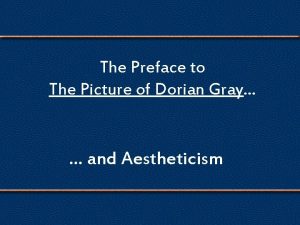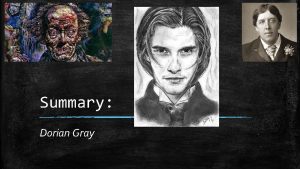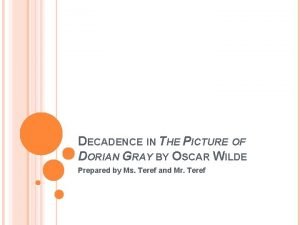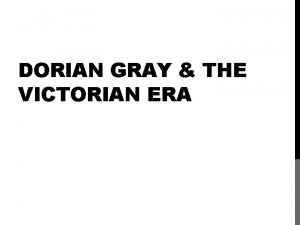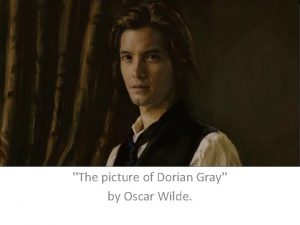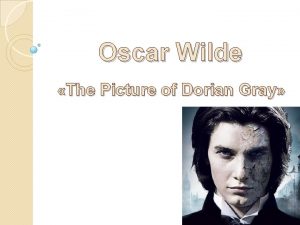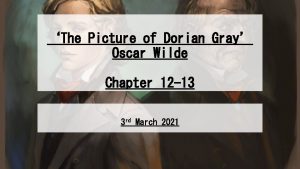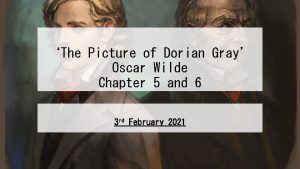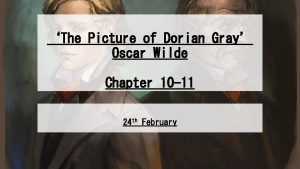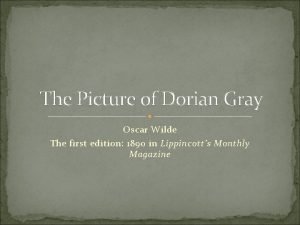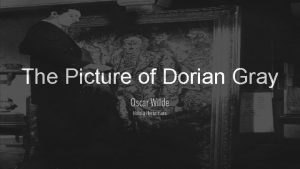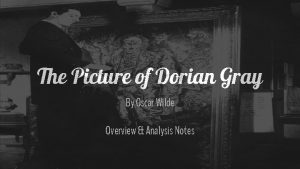The Picture of Dorian Gray Oscar Wilde Chapter











- Slides: 11

‘The Picture of Dorian Gray Oscar Wilde: Chapter 8 -9 10 th February 2021

Learning Purposes • To develop contextual insight to novel • To continue reading, exploring characters, relationships, plot and themes • To build towards an essay question that you will complete at home (2 weeks)

Recap Explore the following: • Dorian’s enthusiasm before the performance (Lily, Emily, Ollie) • The experiences of the play itself and reactions to it (Etholle, Amelia, Lucie H) • Dorian’s showdown with Sibyl (Zaynah, Afiba, Millie, Lucy G, Sally) • Dorian’s behaviour after he leaves and the scene with the picture (Lauren, Autumn, Megan, Faye)

Quiz 1. Name Dorian’s fiancé 2. What is her profession? 3. Why does Dorian like her? Who is she ‘playing’ when he proposed? 4. What does she call Dorian? 5. What is the name of her brother? 6. Where is he moving to? 7. What is his opinion about Dorian? 8. What is significant about Mrs. Vane’s past and Sibyl’s current situation? 9. Where is Dorian when Sibyl sees him on the walk? 10. Define hedonism.

Context: Melodrama • Melodramatic plays were popular in the Victorian period (as with numerous other periods, including today – think about soap operas) • They often had cliff hangers and suspense, and were especially popular with lower class patrons – they were cheap to produce and acting and production were of variable quality • Plays were often grounded in class struggles, such as landlords v tenants; working man v aristocrat; simple girl v rich seducer • Dramatic music often played a role in heightening emotive moments. • “Black Eyed Susan” (1829) was a play in which a young sailor defended his fiancée from both a smuggler and a lustful captain • Wilde has these texts and literary tastes in mind when it comes to Chapter 5, the second added chapter

Context: Class difference • The Victorian era was, in theory a time of social mobility, where people could ascend the class structure • The increasing power of factory owners led to an even bigger distinction between rich and poor, and a more solidified middle class • Women would work more due to the financial constraints that faced families, although this work could be frowned upon as against Victorian perceptions of family life • Some members of the Establishment (upper middle class and aristocratic people) resented this disruption of social order, and were disdainful of people from other classes • We see class issues in the different viewpoints of Dorian and Sybil’s relationship

Chapter 8 Explore one of the following: • Presentation of Lord Henry • Presentation of Dorian

Reading: Chapter 9 Consider: • Basil’s admission and his relationship with Dorian. • The presentation of Dorian’s character.

Chapter 9/10 - Analysis • Basil’s declaration of his obsession with Dorian is in many ways a defense and justification of homosexual love. In 1895, five years after Dorian Gray was published, Wilde was famously convicted of sodomy for his romantic relationship with Lord Alfred Douglas. Wilde defended homosexual love as an emotion experienced by some of the world’s greatest men. He insisted that it had its roots in ancient Greece and was, therefore, fundamental to the development of Western thought and culture. In his trial, when asked to describe the “love that dare not speak its name, ” Wilde explained it as ‘Such a great affection of an elder for a younger man as there was between David and Jonathan, such as Plato made the very basis of his philosophy, and such as you find in the sonnets of Michelangelo and Shakespeare. . It is beautiful, it is fine, it is the noblest form of affection. There is nothing unnatural about it. ’ • This testimony is strikingly similar to Dorian’s reflection upon the kind of affection that Basil shows him: [I]t was really love—[it] had nothing in it that was not noble and intellectual. It was not that mere physical admiration of beauty that is born of the senses, and that dies when the senses tire. It was such love as Michael Angelo had known, and Montaigne, and Winckelmann, and Shakespeare himself.

Homework “Class is an obstacle to fulfilment” Discuss your interpretation of the play so far in light of this quotation. • Clear introduction that outlines argument • 3 supporting paragraphs that explore a different aspect of the novel and create a consistent argument • A conclusion that links to introduction and firmly expresses viewpoint • For today, you just need TWO developed paragraphs

Writing Structure • You should not be writing more than three main paragraphs • Each paragraph should have a clear direction and you should be making judgements about the text • You need supporting quotations • You need relevant contextual links that enrich your exploration • You should be writing in a confident and clear manner
 Dorian gray discussion questions
Dorian gray discussion questions The picture of dorian gray chapter 18
The picture of dorian gray chapter 18 Preface to picture of dorian gray
Preface to picture of dorian gray Dorian gray youth and beauty
Dorian gray youth and beauty Plot of dorian gray
Plot of dorian gray Decadence in the picture of dorian gray
Decadence in the picture of dorian gray The picture of dorian gray victorian era
The picture of dorian gray victorian era Sibyl vane
Sibyl vane Dorian gray chapter 16
Dorian gray chapter 16 The canterville ghost main characters
The canterville ghost main characters El genio irlandes
El genio irlandes The selfish giant plot diagram
The selfish giant plot diagram


